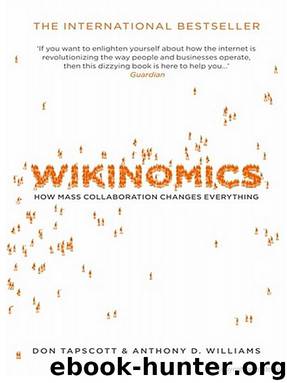Wikinomics by Anthony D. don Tapscott williams & Don Tapscott & Anthony D. Williams

Author:Anthony D.,don Tapscott,williams & Don Tapscott & Anthony D. Williams
Language: eng
Format: azw3
Tags: E-Commerce, Business & Economics, General
ISBN: 9780857895134
Publisher: Atlantic Books Ltd
Published: 2011-03-01T00:00:00+00:00
publishing. Frustrated authors can find their cutting-edge discoveries less
cutting edge after a lumbering review process has delayed final publication by
up to a year, and in some cases longer. With the pace of science increasing
today, that's just not fast enough.
The other problem is that the vast majority of published research today is only
available to paid subscribers. Ever increasing subscription fees, meanwhile, have
made this research less accessible. What's worse is that these impediments to
access persist despite the availability of much cheaper electronic publishing
methods. Though an unlimited number of additional readers could access digital
copies of research at virtually no additional cost, publishers hold back for fear of
creating a Napster-like phenomenon.
No doubt these problems are hangovers from a world of physical distribution
and a much more limited volume of publishing. The current publishing regime
emerged in seventeenth-century Europe, when the pace of discovery was glacial
by twenty-first-century standards. Scientific journals provided the primary
infrastructure for scholarly communication and collaboration. Apart from annual
academic symposiums, journals were the place where scientists could find out
about, engage with, and carefully critique each other's work. Publishing journals
was expensive, entailing significant capital and operational costs.
As the scientific endeavor swells in scale and speed, however, a growing
number of participants in the scientific ecosystem are questioning whether the
antiquated journal system is adequate to satisfy their needs. New communication
technologies render paper-based publishing obsolete. The traditional
peer-reviewed journal system is already being augmented, if not superseded, by
increasing amounts of peer-to-peer collaboration.
Science Goes Large Scale
Organizing the pursuit of knowledge in a peer-to-peer fashion is certainly
nothing new in science. But recent research suggests that collaboration is
exploding. One study conducted by the Santa Fe Institute found that the average
high-energy physicist now has around 173 collaborators. The same study found
that the average number of authors per scientific paper has doubled and tripled in
a number of fields. A growing number of papers
Download
This site does not store any files on its server. We only index and link to content provided by other sites. Please contact the content providers to delete copyright contents if any and email us, we'll remove relevant links or contents immediately.
Hit Refresh by Satya Nadella(9132)
The Compound Effect by Darren Hardy(8965)
Change Your Questions, Change Your Life by Marilee Adams(7780)
Nudge - Improving Decisions about Health, Wealth, and Happiness by Thaler Sunstein(7706)
The Black Swan by Nassim Nicholas Taleb(7128)
Deep Work by Cal Newport(7083)
Rich Dad Poor Dad by Robert T. Kiyosaki(6632)
Daring Greatly by Brene Brown(6512)
Principles: Life and Work by Ray Dalio(6446)
Playing to Win_ How Strategy Really Works by A.G. Lafley & Roger L. Martin(6301)
Man-made Catastrophes and Risk Information Concealment by Dmitry Chernov & Didier Sornette(6019)
Big Magic: Creative Living Beyond Fear by Elizabeth Gilbert(5771)
Digital Minimalism by Cal Newport;(5764)
The Myth of the Strong Leader by Archie Brown(5507)
The Slight Edge by Jeff Olson(5417)
Discipline Equals Freedom by Jocko Willink(5389)
The Motivation Myth by Jeff Haden(5212)
The Laws of Human Nature by Robert Greene(5208)
Stone's Rules by Roger Stone(5087)
